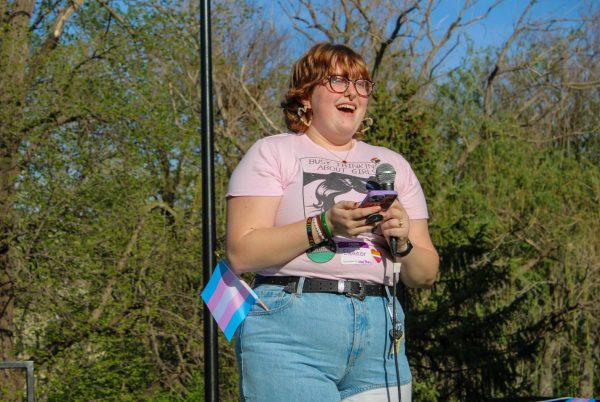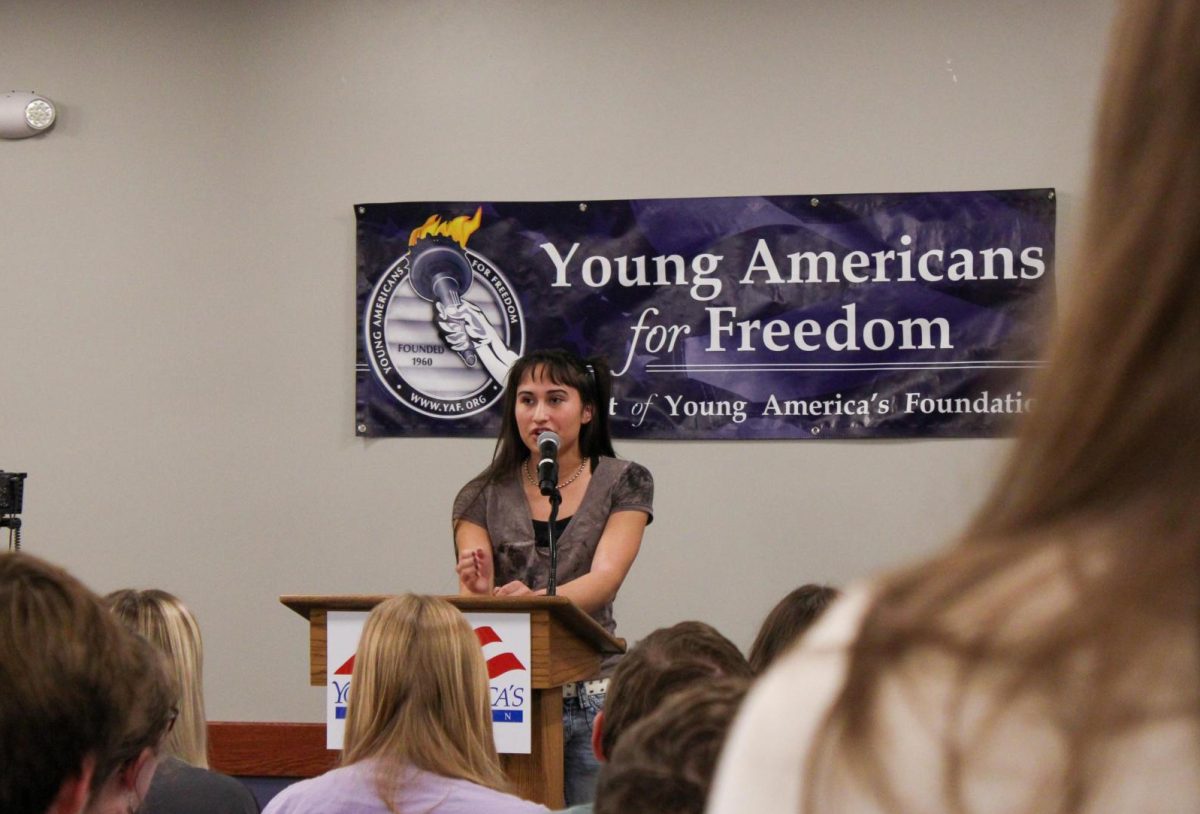Editor’s note: We had some errors with titles in our original online and print article. Pondillo is the treasurer of SAGA, not the president, and Smith is not a member of SAGA. Additionally, we have removed the word “conservative” in mentions of Cole; while she has appeared and is often associated with conservative figures and media, she describes herself as an activist first. We also did not include every group who helped host “An Evening of Resillience.” We have added the organizations involved.
Young Americans for Freedom and the Sexuality and Gender Alliance — with the help of Social Justice Alliance, Students for Cultivating Change Kansas State, Social Transformation Studies along with several other K-State organizations — both held events covering transgender issues at 5:30 p.m. Wednesday on campus.
Brooklyn Davis, freshman member of the Diversity, Equity, Inclusion and Belonging board, said it all began when the board voted on a funding request YAF submitted to bring activist speaker Chloe Cole to campus.
“It was the first time it had been such a big decision and so against what a lot of people thought in our committee, but I think as a whole we handled it pretty well,” Davis said.
YAF was given $5,500 to hold the event, with the majority of the 20-person board abstaining from the vote, Davis said.
“I abstained because I didn’t want to let my personal bias affect it in any way, so I stood out from the voting, but it did pass,” Davis said. “I think it was like one or two said ‘no’ and then three said ‘yes,’ but the majority abstained.”
Davis said she doesn’t think rumors of YAF threatening to sue the board are true.
“They did not say that during their presentation whatsoever,” Davis said. “If that was an email sent to my chair, I don’t know, but I’m gonna say from what I experienced during the meeting, that did not happen.”
Chairman of YAF Thomas Adcock said upon promoting its event, the group received backlash.
“Just this last week, a lot of the people on campus have been washing off our chalk and posting mean things on Snapchat,” Adcock, junior in military history, said. “They’re trying to censor us. They wrote false times down, false dates down on our chalk to try to prevent people from coming to our event.”
Adcock said YAF stands by its chalked messages and posters.
“We’re not going to apologize for something we’ve said or done,” Adcock said. “Us crossing out the transgender flag is not us hating trans people or saying they don’t need to exist, that is us saying we do not agree with this ideology.”
Ashe Vujevic, junior in wildlife biology and social transformation studies, said queer people on campus avoid groups like YAF because of its hateful message.
“I know people who would kill themselves if they weren’t on gender-affirming care,” Vujevic said. “Something like gender dysphoria needs care, and we have options, but those same options are being denied. Why would I feel safe around people who want to take that away from me?”

SAGA Treasurer Joseph Pondillo said the YAF event raised concerns for the safety and well-being of queer and trans students.
“From there, we [SAGA] said if they’re going to bring an environment that isn’t welcoming of everyone, we want to create a space that does welcome everyone and their identities but also brings people together rather than tear people apart,” Pondillo said.
Everyone is welcome at YAF events, Adcock said, but he believes many view the group as hateful.
“It’s that fear mindset of ‘someone’s speaking against what I believe in, so I’m going to try to silence them so I don’t have to hear the opposition’s side,’” Adcock said. “They’re more than welcome to come to our events. The opportunity is there to have a dialogue, but they don’t want to come.”
Vujevic said organizations like YAF jeopardize the rights of queer people.
“Of course [queer students] avoid YAF, who sponsored Chloe Cole,” Vujevic said. “If you sponsor her, you’re not just learning for free speech, you are supporting her message. You paid her to be here. You want that same message to be spread, and that opens up a chance for her to become involved in Kansas legislation and change the rights that queer people currently have.”
Pondillo said he believes some queer people on campus feel threatened by groups like YAF.
“We’re at a predominantly agriculture-based school with people from smaller cities that may not be open and or aware of different identities, so just coming into K-State, you kind of have that fear sometimes of you don’t know what to expect or what might happen,” Pondillo said.
Adcock said he understands people wanting to feel accepted, but for him it’s a religious issue.
“Whenever demons are mentioned in the Bible of possessing people, they identify as they/them,” Adcock said. “Now, am I calling trans people or people who use they/them devils or demons? No, I am not. I’m saying they’re being corrupted by an evil spirit, and I want to do everything I can to help them overcome that and to show love to them.”
Vujevic said they felt YAF’s response was inflammatory.
“A lot of their supporters continually turned to hate,” Vujevic said. “In one instance, we got called RGB hair colors, stupid insults like that … I personally was scared to walk around with my buttons on campus, because I wear pins that showcase my identity.”
Cole said her end goal is a ban on medically transitioning gender for children under 18.
“I am advocating for a better standard of care in general for trans people — for gender dysphoria,” Cole said. “I think there should be a more holistic standard in treating these patients that isn’t just entirely focused around transitioning as the first step.”
Vujevic said what Cole advocates for is not good enough for young trans people whose well-being relies on gender-affirming care.
“It is a matter of life and death, and that’s what science is telling us right now,” Vujevic said. “If we take away this care from people, they’re going to die.”
Cole said her message extends to both those transitioning and detransitioning.
“We all should have compassion for anybody going through any part of this, whether they’re currently in transition, whether they’re considering transition, whether they’re detransitioning, it’s painful,” Cole said. “I think we all deserve better.”
Pondillo said he believes there’s a place for detransitioners within the LGBTQ+ community.
“Gender and identity, it’s an ever-changing thing,” Pondillo said. “I think especially whenever someone’s trying to find who they are, it takes a lot of searching until you can be comfortable in a place. So, I think if someone were to detransition, there’d still be a space for them.”
While it’s important to uplift voices, people should be careful about tokenizing one person’s perspective as being representative of an entire group, Pondillo said.
“I think it can be really impactful to have those different voices, but also we have to understand it is one section within the community, and there’s so many other voices to embrace and lift up to share their experiences,” Pondillo said. “Not just one person represents a whole entire community alone.”
Some faculty said they wish more staff would speak publicly on these issues, but can’t in fear of disciplinary action.
“There’s a void there, and it speaks for itself,” an anonymous faculty member said.
The coordinator of the Spectrum Center, Brandon Haddock, declined to comment.
Thomas Lane, vice president of academic success and student affairs and dean of students, said K-State has an obligation to both free speech and inclusivity as a public university.
“As we live out both these obligations, which can sometimes be in tension with each other, it’s important we engage in constructive dialogue to address differences in perspectives, work to increase understanding and identify ways to meaningfully support impacted K-State community members,” Lane said.
If you’re affected by these events, you can reach K-State counseling services in Room 101 at Lafene Health Center or by phone at 785-532-692.
























































































































Liberty Belote • Apr 23, 2024 at 12:42 pm
I appreciate that these journalists covered these highly impactful events that happened on campus as tactfully as possible; these events, whether it’s immediately visible or not, affect real people. The SAGA event was a beautiful place to be that united us all in the joy of being LGBTQ+, and a good reminder of how tight-knit, loving, and assured our community really is, rather than what it is misconstrued to be. I do wish that our SGA representatives took a strong stance on protecting trans students from emboldened dissenters who believe that they have a say in how someone should identify. Often times, framing the conversation as a discussion only about “medical transitions for minors” is a ruse used to further intrude on the actions and lives of fully consenting and free-thinking adults, and even the social transition of minors that requires no biological intervention, but can, at times, be just as affirming and important for those just figuring out their identity. While discussion should be open as research on interventions like hormone blockers is comfortably concrete yet, trans issues and people shouldn’t be harmed and devalued in the meantime.
Eleanor Smith • Apr 19, 2024 at 3:18 pm
This article gets a lot of facts wrong, at least about the Queer Joy event. Pondillo isn’t the president of SAGA, I’m not in SAGA and I didn’t say anything about the chalk in my speech, SJA, Cultivating Change, Spectrum Center, and the STran and Leadership departments all partnered in this event. This article focuses so much on the arguments at play and less on the actual events that were very interesting and successful for both sides. Very clickbait-y and a lot of whats wrong with modern journalism.